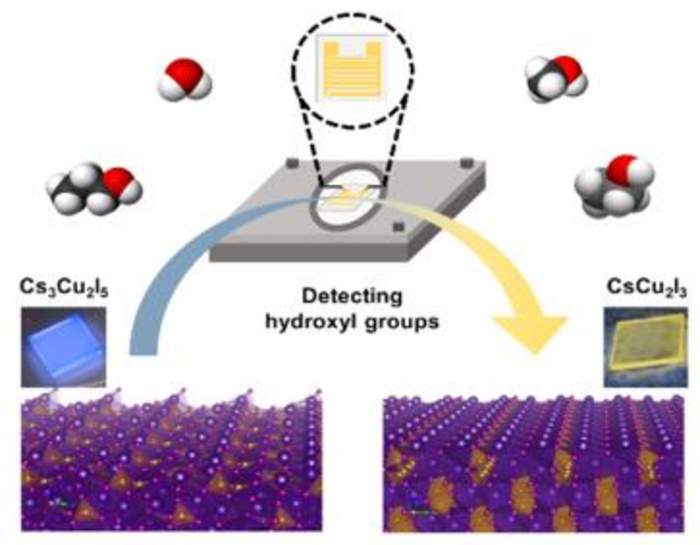The current semiconductor materials sense molecules of gas. These molecules are adsorbed on the sensing layer’s surface, which results in electrical resistance change. The prevailing materials are underused because the selectivity of gas is low as the resistance changes irrespective of the gas type. In most scenarios, the only indicator is the electrical property change.
The team of researchers developed a new material. When this new material is exposed to a specific gas, its crystal structure changes. Based on this, it made a high-selectivity gas sensor that changes resistance and color simultaneously.
A copper-based environment-friendly metal halide thin film material, non-toxic Cs3Cu2I5, was synthesized by the research team. The team assured that the material can change reversibly via supercomputer-based simulations and showed that water molecules are successful stimulants for crystal change.

The crystal structure can be changed by water molecules. Image credit: Korea Institute of Materials Science (KIMS).
The team created a sensor tool that is based on this theory and found that the tool can efficiently sense water molecules. By using electrical properties and color changes simultaneously, the team was successful in differentiating several alcohols with different polarities.
The global gas sensor market value was $1 billion in 2021, and it is anticipated to increase by 7.5% every year. Semiconductor gas sensor technology is ideal for lightweight products as well as miniaturization and mass production—which could be applied in several fields such as the Internet of Things (IoT), mobile phones, agriculture, and the livestock industry. This technology has key research significance as it offered a new sensor model and demonstration case with the use of a material that has a changeable crystalline structure for the first time all across the globe.
“This research suggests a new direction for development of semiconductor sensor devices and new materials. Due to its response characteristics, the new sensing material is expected to be applied to various industries such as agriculture, livestock, medical, and mobile,” said the principal investigators, Dr. Jin Woo Choi, a senior researcher at KIMS, and Dr. Han Seul Kim, a senior researcher at KISTI.
The research received funding from the Ministry of Science and ICT and was backed by the National Supercomputer No. 5 R&D Innovation Support Program of KISTI and the basic research project of the Ministry of Science and ICT. On July 11th, 2022, the study was published as a cover paper in a top-tier materials science journal Advanced Functional Materials.
At present, the team is studying to maximize selectivity with the use of photo-electrical responsiveness in combination and producing new crystalline materials to react to several gases.
Journal Reference
Lee. D., et al. (2022) Multimodal Gas Sensor Detecting Hydroxyl Groups with Phase Transition Based on Eco-Friendly Lead-Free Metal Halides. Advanced Functional Materials. doi.org/10.1002/adfm.202270160.